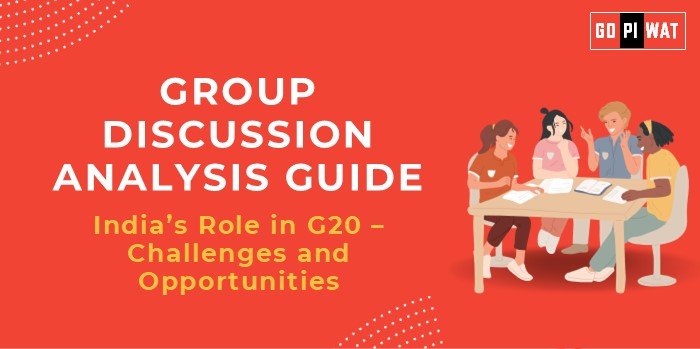📋 Group Discussion Analysis Guide: India’s Role in G20 – Challenges and Opportunities
🌐 Introduction to India’s G20 Role
📖 Opening Context
India’s G20 Presidency positioned the country as a significant leader on the global stage, addressing pressing issues like economic recovery, energy security, and digital infrastructure, all under the inclusive theme of “One Earth, One Family, One Future.”
📚 Background and Objective
India’s presidency began on December 1, 2022, during a period of global instability due to the COVID-19 pandemic, geopolitical conflicts, and climate urgencies. The G20, an influential international forum with 19 countries and the European Union, focuses on economic and financial cooperation. This presidency allowed India to elevate the interests of the Global South and steer global discourse toward inclusivity and sustainability.
📊 Quick Facts and Key Statistics
🌱 India’s Focus Areas: Inclusive growth, digital public infrastructure, climate financing, women’s empowerment, global food security, and disaster resilience.
🏆 Milestone Achievement: The adoption of the G20 2023 Action Plan to accelerate Sustainable Development Goals (SDGs) reflects India’s commitment to global welfare.
👥 Stakeholders and Their Roles
- 🇮🇳 India’s Leadership: Aimed to create a people-centric, equitable framework for the G20 agenda, emphasizing the needs of the developing world.
- 🌍 Developed Nations and Global North: Crucial contributors to climate financing, economic recovery, and technology transfers.
- 🌎 Developing Countries and Global South: Expected India’s presidency to address climate justice, energy security, and food supply resilience.
- 📊 International Organizations: Entities like the ADB supported initiatives such as the Global Initiative on Digital Health.
🏆 Achievements and Challenges
✨ Achievements
- 🌍 Sustainable Development Goals: India led the creation of the 2023 Action Plan, focusing on SDGs across health, education, and climate.
- 🗣️ Inclusive Dialogue: The “Voice of the Global South” summit brought developing nations into G20 discussions.
- ☀️ Climate Commitments: Advanced the Global Biofuels Alliance and promoted renewable energy goals.
- 💻 Digital Public Infrastructure: India shared its expertise in digital repositories, benefiting countries through inclusive digital growth.
⚠️ Challenges
- 🌐 Geopolitical Tensions: Balancing relationships amid the Russia-Ukraine conflict and managing China’s regional assertiveness posed ongoing diplomatic challenges.
- 🤝 Diverse Interests of G20 Members: Disparities in members’ national interests made consensus difficult on issues like climate financing and food security.
- 🍽️ Energy and Food Security: The Black Sea Grain Deal highlighted ongoing challenges to secure food and energy supplies globally.
💡 Structured Arguments for Discussion
Supporting Stance: “India’s G20 Presidency demonstrated exemplary leadership by accelerating SDG progress and representing the interests of the Global South.”
Opposing Stance: “Despite India’s efforts, geopolitical conflicts and internal G20 differences limited the presidency’s impact on major economic and security issues.”
Balanced Perspective: “India’s G20 Presidency made strides in sustainable growth and inclusivity but faced significant challenges from geopolitical complexities.”
🗣️ Effective Discussion Approaches
- 📊 Opening Approaches:
- 📈 Statistical Insight: “The G20 represents over 80% of global GDP, underscoring its power to influence global economic direction—an opportunity India seized to champion equitable growth.”
- 🗨️ Quote Integration: “With Prime Minister Modi’s message that ‘today’s era must not be of war,’ India highlighted the importance of peace in achieving global progress.”
- ⚡ Counter-Argument Handling: Acknowledge the challenges of balancing varied interests but emphasize India’s achievements in facilitating discussions on energy security and climate financing. Reference initiatives like the Global Biofuels Alliance to highlight actionable progress.
📈 Strategic Analysis of Strengths and Weaknesses (SWOT)
- 💪 Strengths: Leading Global South representation; strong advocacy for climate action and sustainable development.
- 🔧 Weaknesses: Limited capacity to resolve geopolitical conflicts; economic divides within G20 members.
- 🚀 Opportunities: Championing digital transformation and inclusive development; establishing stronger alliances with the African Union and other Global South nations.
- ⚠️ Threats: Regional tensions, particularly with China and Russia; balancing competing G20 member interests.
🎓 Connecting with B-School Applications
- 💼 Real-World Applications: G20 topics like climate financing, digital public infrastructure, and sustainable development offer key areas for B-school projects in fields like international business, public policy, and economics.
- ❓ Sample Interview Questions:
- “How can India leverage its G20 experience to improve multilateral cooperation?”
- “What challenges does India face in representing developing nations on a global stage?”
- 🧠 Insights for B-School Students: Explore the impact of digital infrastructure on inclusive growth, study international economic policies for real-world implementation, and understand how geopolitics shape financial and trade policies.


